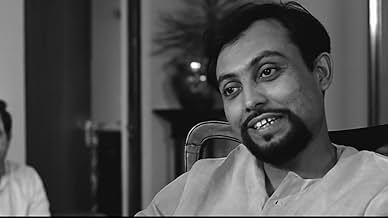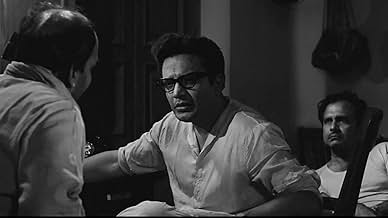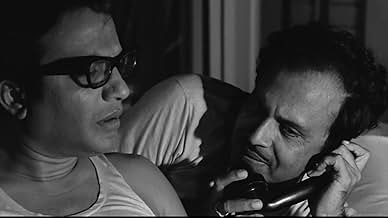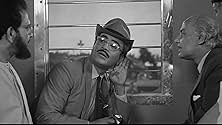VALUTAZIONE IMDb
7,2/10
1187
LA TUA VALUTAZIONE
Aggiungi una trama nella tua linguaByomkesh Bakshi, a detective, is hired by a rich man to investigate the name of an actress appeared in a movie decades ago, who has eloped ever since. The case became complicated when the ri... Leggi tuttoByomkesh Bakshi, a detective, is hired by a rich man to investigate the name of an actress appeared in a movie decades ago, who has eloped ever since. The case became complicated when the rich man is murdered by someone for that.Byomkesh Bakshi, a detective, is hired by a rich man to investigate the name of an actress appeared in a movie decades ago, who has eloped ever since. The case became complicated when the rich man is murdered by someone for that.
- Regia
- Sceneggiatura
- Star
- Premi
- 2 vittorie totali
Nripati Chatterjee
- Mushkil Mia
- (as Nripati Chattopadhyay)
Shekhar Chatterjee
- Ajit Bandopadhay
- (as Shekhar Chattopadhyay)
Subhendu Chatterjee
- Bijoy
- (as Subhendu Chattopadhyay)
Recensioni in evidenza
The original story was rather weak. 1 > It was never clear from the novel why Nishanath was interested about Sunayana. Ray at least tried to explain why Nishanath suspected the existence of Sunayan n the colony. 2 > The end of the novel was too dramatic, not much practical.
One more thing, at initial investigation Byomkesh was a bit rough with the inmates of colony, might be he was emotionally involved as he could not save client's life. Pythons, skeletons, etc. are shown to make the film more cinematic.
Strength of the movie: - 1 > Performance of Uttam Kumar, characterization was excellent. 2 > Performance of all the actors. 3 > Logical deductions and psychological analysis thru photo gallery. 4 > The theme seemed to be much practical with respect to the original story.
Weakness: - 1 > the progress of the movie was slow initially and suddenly gears up. the pace was not uniform.Ending was rather abrupt. 2 > Although Uttam Kumar tried his best, the idea of having a Japanese horticulturist. It was a bit comedy there, but overall Byomkesh was very serious throughout the movie. These two do not match. 3 > When Byomkesh was arriving in Mohanpur, it was initially a local train( no separate engine), but in the next shot it was shown that a separate engine is there. Anyhow, as this stays just for a second on the screen, the error does not have much impact 4 > When Byomkesh throws the key inside the taxi, he was too close to Dr. das. Byomkesh could have been easily noticed by Dr.Das.
Overall it was very enjoyable.
One more thing, at initial investigation Byomkesh was a bit rough with the inmates of colony, might be he was emotionally involved as he could not save client's life. Pythons, skeletons, etc. are shown to make the film more cinematic.
Strength of the movie: - 1 > Performance of Uttam Kumar, characterization was excellent. 2 > Performance of all the actors. 3 > Logical deductions and psychological analysis thru photo gallery. 4 > The theme seemed to be much practical with respect to the original story.
Weakness: - 1 > the progress of the movie was slow initially and suddenly gears up. the pace was not uniform.Ending was rather abrupt. 2 > Although Uttam Kumar tried his best, the idea of having a Japanese horticulturist. It was a bit comedy there, but overall Byomkesh was very serious throughout the movie. These two do not match. 3 > When Byomkesh was arriving in Mohanpur, it was initially a local train( no separate engine), but in the next shot it was shown that a separate engine is there. Anyhow, as this stays just for a second on the screen, the error does not have much impact 4 > When Byomkesh throws the key inside the taxi, he was too close to Dr. das. Byomkesh could have been easily noticed by Dr.Das.
Overall it was very enjoyable.
I have watched a number of different renditions of Byomkesh Bakshi, especially over the last few years, and this has been one of the most stylish portrayals of the character. First things first, I feel this is one of the weaker plots in the Byomkesh series and there are some much greater stories in the series. So, going in, I was a little skeptical, but there are certain elements that have been added in this, which make it more interesting.
Second, Uttam Kumar's portrayal of Byomkesh was great. He captured the spirit and embellished it with his own nuances, which make it a very engrossing watch. The supporting cast were also quite good. I liked the chemistry between Byomkesh and Ajit. The direction was good, although the pace was a little choppy in parts. I also felt there were certain elements in the movie that weren't quite Byomkesh-like. The disguises, the gun, and the bachelorhood were in stark contrast to the actual book character, and were a little jarring. But overall, this movie was entertaining and fun.
Second, Uttam Kumar's portrayal of Byomkesh was great. He captured the spirit and embellished it with his own nuances, which make it a very engrossing watch. The supporting cast were also quite good. I liked the chemistry between Byomkesh and Ajit. The direction was good, although the pace was a little choppy in parts. I also felt there were certain elements in the movie that weren't quite Byomkesh-like. The disguises, the gun, and the bachelorhood were in stark contrast to the actual book character, and were a little jarring. But overall, this movie was entertaining and fun.
This movie is a disgrace to Satyajit Ray, my favorite director. Actually I watched this movie, after reading the novel Chiriakhana, by Saradindu Bandyopadhyay, the novel from which the movie was adapted. I couldn't watch the movie beyond one hour. Poor selection of characters, worst screenplay, a steep deviation from the original story, contributed to the failure of the movie. The original story by Bandyopadhyay, was one of the best detective stories ever written in Bengali, even in any Indian language.If Ray wanted to make an ordinary Indian, hero-centered mystery movie, he could have made such a movie. But destroying a splendid story like this is the most intolerable aspect in this movie. Those who had already read the novel, should avoid this movie.
(Reviewed on the basis of watching on T.V. 36 years after release)
Plot: An ex-judge Nishanath Sen, invites the famous sleuth Byomkesh Bakshi and his associate Ajit to his residential colony. The colony is inhabited by peculiar people most of whom are social outcasts; and hence has got the name 'chiriyakhana' (zoo). Nishanath also asks Byomkesh to inquire about all the details of a singer-cum-heroine of an erstwhile Bengali film. Soon, news arrives that Nishanath has been brutally murdered in his colony. Will Byomkesh be able to nab the culprit from among the weird residents of the 'chiriyakhana'?
Review:Byomkesh Bakshi, the dhoti-panjabi clad Bangalee gentleman sleuth who prefers to call himself a 'satyanneshi', has been a household favourite since being introduced by Sharadindu Bannerjee in the 1930's. As a result when it was announced that Uttam Kumar and Satyajit Ray, the greatest star and director in the history of Bengali cinema respectively would again join forces one year after the classic 'Nayak' (1966) to bring one of the biggest Byomkesh-bestsellers 'Chiriyakhana' onto the big-screen; expectations were bound to be sky-high. Were the expectations fulfilled? Depends on whether the viewer is a Byomkesh fan or not.
If one is a die-hard fan of the 'satyanneshi'-stories and expects to see an equal reflection of the sleuth in Uttam Kumar; then there is a clear word of advice: STAY FAR AWAY! For it should be made clear at the beginning itself that barring the title of the story and names of the characters, the whole story and characterizations have been altered inside-out by the director, including Byomkesh and his accomplice Ajit. This Byomkesh is a complete Ray-product bearing no stamp of Sharadindu.
Let us start from the beginning. A unique charm and specialty about Byomkesh has been the fact that he is married, is a father and is as worldly-minded like any common Bangalee; and yet he never allows that to be a hindrance to his profession. This makes his task more challenging than a Sherlock Holmes or a Feluda. But Ray models Byomkesh on his own creation Feluda and makes him a bachelor. Instead the forever-bachelor Ajit becomes a married man here. Another shock which the viewers are exposed to right at the start is Basuki, a snake which has been domesticated by the on-screen Byomkesh but would have been unimaginable for the literary Byomkesh who is a common family-man. So was the skeleton, hanging in his study. Whatever remaining expectations of any similarities are thoroughly crushed when our Bangalee 'satyanneshi' proudly acknowledges his taste for everything and accepts a glass of whiskey from a colourful host! This trait was undoubtedly drawn by Ray from the Western spies and clearly established the fact that this Byomkesh is not a conventional Bangalee 'gentleman'. Although we don't know much about the literary Byomkesh's taste for cinema; it was hilarious to see the 'Mahanayak' expressing his abject disapproval for contemporary Bengali cinema, especially after 'Nayak' a year back. Another interesting point is the camaraderie between Byomkesh and Ajit where they alternately address each other as both 'tumi' and 'tui'; while in the books it's always strictly 'tumi' even after years of acquaintance.
For fans of the novel also it could be a huge disappointment. It's adequate to say, it would be much easier to mark the similarities, than to point out the differences! But if one is willing to ignore the novel, then one must applaud the director for weaving a totally different story from someone else's premise and characters and yet delivering quiet an engaging whodunit-thriller. It's still tough to understand the reason why anyone should tamper with a perfectly fine story, give it his own shape and still give its credit to the original writer! A viewer ignorant of the novel, would praise or criticise Sharadindu if he likes or dislikes the film-story; where else in reality it's Ray who should be held accountable for both.
Ray takes all liberties in molding his Byomkesh and soon the viewers also begin to enjoy the fun. Amidst the barrage of alterations, there is one sequence where the director must be patted on the back for wriggling out of a really dilemma-tic situation. In the novel, the main culprit passes on a cyanide ampule to his wife by engaging in a long lip-lock with her. It goes without saying such a sequence would have created a mass uproar back then; and yet Ray was not a director who would settle for a cheat-kiss. Hence, it was an indescribable relief when he steered clear of any such controversy and unearthed a climax which was wholly acceptable to a conservative family audience. A heart-felt thanks to the master for sparing me the blushes in front of my parents!
As for the performances, Uttam Kumar brought his heroic personality to the character just as Soumitra Chatterjee would go on to do for Feluda. Although he gave it a more serious touch sacrificing on the sense of humour of the literary avatar. It was amusing to see him in the get-up of a Japanese horticulturist Okakhora with the characteristic fleet- footed walk, besides portraying a Kabuliwala as well. The only odd point that strikes is Uttam's height, as Japanese are seldom so tall. Shailen Mukherjee as Ajit is good. He is quite funny when Byomkesh brings Basuki near him or when he asks Dr. Das fearfully if he had ever been to Japan. Chinmoy Roy was also quite funny in asking to take his photo or when he was doing a 'namashkar' while holding a pup all along. Special mention must be made of Subrota Mukherjee during the interrogation scene which was hilarious. Jahar Ganguly and the inspector were the others who impressed.
Overall, 'Chiriyakhana' is Ray's best thriller beating the two Feluda- adventures, which were based on his own story. It might even have been better if he had made this film outside the brand-Byomkesh. The die-hard 'satyanneshi' fans would surely agree.
Plot: An ex-judge Nishanath Sen, invites the famous sleuth Byomkesh Bakshi and his associate Ajit to his residential colony. The colony is inhabited by peculiar people most of whom are social outcasts; and hence has got the name 'chiriyakhana' (zoo). Nishanath also asks Byomkesh to inquire about all the details of a singer-cum-heroine of an erstwhile Bengali film. Soon, news arrives that Nishanath has been brutally murdered in his colony. Will Byomkesh be able to nab the culprit from among the weird residents of the 'chiriyakhana'?
Review:Byomkesh Bakshi, the dhoti-panjabi clad Bangalee gentleman sleuth who prefers to call himself a 'satyanneshi', has been a household favourite since being introduced by Sharadindu Bannerjee in the 1930's. As a result when it was announced that Uttam Kumar and Satyajit Ray, the greatest star and director in the history of Bengali cinema respectively would again join forces one year after the classic 'Nayak' (1966) to bring one of the biggest Byomkesh-bestsellers 'Chiriyakhana' onto the big-screen; expectations were bound to be sky-high. Were the expectations fulfilled? Depends on whether the viewer is a Byomkesh fan or not.
If one is a die-hard fan of the 'satyanneshi'-stories and expects to see an equal reflection of the sleuth in Uttam Kumar; then there is a clear word of advice: STAY FAR AWAY! For it should be made clear at the beginning itself that barring the title of the story and names of the characters, the whole story and characterizations have been altered inside-out by the director, including Byomkesh and his accomplice Ajit. This Byomkesh is a complete Ray-product bearing no stamp of Sharadindu.
Let us start from the beginning. A unique charm and specialty about Byomkesh has been the fact that he is married, is a father and is as worldly-minded like any common Bangalee; and yet he never allows that to be a hindrance to his profession. This makes his task more challenging than a Sherlock Holmes or a Feluda. But Ray models Byomkesh on his own creation Feluda and makes him a bachelor. Instead the forever-bachelor Ajit becomes a married man here. Another shock which the viewers are exposed to right at the start is Basuki, a snake which has been domesticated by the on-screen Byomkesh but would have been unimaginable for the literary Byomkesh who is a common family-man. So was the skeleton, hanging in his study. Whatever remaining expectations of any similarities are thoroughly crushed when our Bangalee 'satyanneshi' proudly acknowledges his taste for everything and accepts a glass of whiskey from a colourful host! This trait was undoubtedly drawn by Ray from the Western spies and clearly established the fact that this Byomkesh is not a conventional Bangalee 'gentleman'. Although we don't know much about the literary Byomkesh's taste for cinema; it was hilarious to see the 'Mahanayak' expressing his abject disapproval for contemporary Bengali cinema, especially after 'Nayak' a year back. Another interesting point is the camaraderie between Byomkesh and Ajit where they alternately address each other as both 'tumi' and 'tui'; while in the books it's always strictly 'tumi' even after years of acquaintance.
For fans of the novel also it could be a huge disappointment. It's adequate to say, it would be much easier to mark the similarities, than to point out the differences! But if one is willing to ignore the novel, then one must applaud the director for weaving a totally different story from someone else's premise and characters and yet delivering quiet an engaging whodunit-thriller. It's still tough to understand the reason why anyone should tamper with a perfectly fine story, give it his own shape and still give its credit to the original writer! A viewer ignorant of the novel, would praise or criticise Sharadindu if he likes or dislikes the film-story; where else in reality it's Ray who should be held accountable for both.
Ray takes all liberties in molding his Byomkesh and soon the viewers also begin to enjoy the fun. Amidst the barrage of alterations, there is one sequence where the director must be patted on the back for wriggling out of a really dilemma-tic situation. In the novel, the main culprit passes on a cyanide ampule to his wife by engaging in a long lip-lock with her. It goes without saying such a sequence would have created a mass uproar back then; and yet Ray was not a director who would settle for a cheat-kiss. Hence, it was an indescribable relief when he steered clear of any such controversy and unearthed a climax which was wholly acceptable to a conservative family audience. A heart-felt thanks to the master for sparing me the blushes in front of my parents!
As for the performances, Uttam Kumar brought his heroic personality to the character just as Soumitra Chatterjee would go on to do for Feluda. Although he gave it a more serious touch sacrificing on the sense of humour of the literary avatar. It was amusing to see him in the get-up of a Japanese horticulturist Okakhora with the characteristic fleet- footed walk, besides portraying a Kabuliwala as well. The only odd point that strikes is Uttam's height, as Japanese are seldom so tall. Shailen Mukherjee as Ajit is good. He is quite funny when Byomkesh brings Basuki near him or when he asks Dr. Das fearfully if he had ever been to Japan. Chinmoy Roy was also quite funny in asking to take his photo or when he was doing a 'namashkar' while holding a pup all along. Special mention must be made of Subrota Mukherjee during the interrogation scene which was hilarious. Jahar Ganguly and the inspector were the others who impressed.
Overall, 'Chiriyakhana' is Ray's best thriller beating the two Feluda- adventures, which were based on his own story. It might even have been better if he had made this film outside the brand-Byomkesh. The die-hard 'satyanneshi' fans would surely agree.
I watched this movie for the second time yesterday after a gap of about twenty years! The only difference is that now I have read all the original stories of Byomkesh. The movie as well as the characters are Satyajit's and not Saradindu's, which is a pity since I adore Saradindu's Byomkesh Bakshi. I guess this movie was made to cash on Uttam Kumar's star power at the box office. Although, I admire Uttam, unfortunately, I do not quite like him as Byomkesh. He is more of a star with his usual mannerisms in this movie...overall a good entertainer if you are not familiar with Saradindu's Byomkesh but otherwise, this is one of the weaker films of Ray as well as of Uttam Kumar.
Lo sapevi?
- QuizThe film was initially meant to be directed by one of Satyajit Ray's assistant directors, who asked Ray to direct the first couple of days to get things started and then asked him to direct the whole thing as he didn't feel up to the task. Ray reluctantly agreed, as he was having trouble funding Goopy Gyne Bagha Byne (1969), but felt he lacked preparation and didn't connect with the subject matter, later referring to the finished work as his "most unsatisfying film".
I più visti
Accedi per valutare e creare un elenco di titoli salvati per ottenere consigli personalizzati
- How long is The Zoo?Powered by Alexa
Dettagli
- Paese di origine
- Sito ufficiale
- Lingua
- Celebre anche come
- The Zoo
- Luoghi delle riprese
- Kolkata, Bengala Occidentale, India(Bomkesh's house)
- Azienda produttrice
- Vedi altri crediti dell’azienda su IMDbPro
- Tempo di esecuzione2 ore 5 minuti
- Colore
Contribuisci a questa pagina
Suggerisci una modifica o aggiungi i contenuti mancanti





















